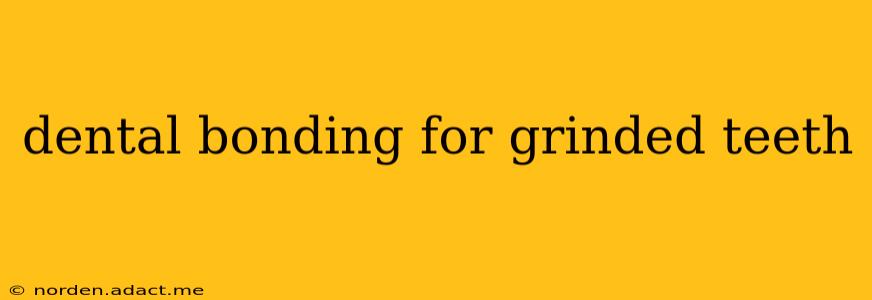Teeth grinding, or bruxism, is a common issue affecting millions. The constant pressure can wear down tooth enamel, leaving teeth shorter, more sensitive, and aesthetically compromised. Dental bonding offers a versatile and effective solution for restoring the appearance and functionality of teeth damaged by grinding. This comprehensive guide explores the use of dental bonding for grinded teeth, addressing common questions and concerns.
What is Dental Bonding?
Dental bonding is a cosmetic procedure where a tooth-colored resin material is applied to the surface of teeth and then hardened with a special light. This resin can be sculpted and shaped to repair chips, cracks, discoloration, and even gaps between teeth. For grinded teeth, bonding helps to rebuild the lost enamel, restoring the tooth's original shape and length. The process is relatively quick and minimally invasive, often requiring only one dental visit.
How is Bonding Used to Repair Grinded Teeth?
A dentist will first thoroughly clean and prepare the tooth surface. They may lightly etch the enamel to help the bonding material adhere properly. Then, they apply layers of the resin, carefully sculpting it to match the surrounding teeth's shape and color. Once the desired shape and color are achieved, a special curing light is used to harden the resin, making it strong and durable. Finally, the dentist will polish the bonding to ensure a smooth, natural-looking finish.
What are the Advantages of Dental Bonding for Grinded Teeth?
- Aesthetically Pleasing: Bonding seamlessly blends with natural tooth enamel, restoring a natural-looking smile.
- Conservative Treatment: It’s a minimally invasive procedure, preserving more of the natural tooth structure compared to other restorative options like crowns or veneers.
- Cost-Effective: Generally, dental bonding is less expensive than other cosmetic procedures.
- Quick Procedure: Often completed in a single appointment.
- Versatile: Can address various cosmetic imperfections caused by grinding, including chipped edges, uneven lengths, and discoloration.
How Long Does Dental Bonding Last?
The longevity of dental bonding depends on several factors, including the individual's oral hygiene habits, the extent of the damage repaired, and the location of the bonding. With proper care, dental bonding can last for several years, even up to a decade. However, it's important to maintain good oral hygiene and avoid habits like teeth grinding or biting on hard objects.
Does Dental Bonding Hurt?
The procedure is typically painless. Your dentist will likely apply a numbing agent to ensure your comfort throughout the process. Any discomfort should be minimal and temporary.
Is Dental Bonding a Permanent Solution?
While dental bonding is very durable, it's not a permanent solution. Over time, the bonding material can chip or stain. Regular checkups and proper oral hygiene are essential to prolong the lifespan of the bonding. If the damage is extensive, your dentist might recommend alternative treatments like veneers or crowns.
Can I Grind My Teeth After Dental Bonding?
While dental bonding strengthens and rebuilds the teeth, it doesn't completely eliminate the risk of further damage if you continue to grind your teeth. Addressing the underlying cause of bruxism, such as stress management techniques or a custom mouthguard, is crucial for long-term protection of your teeth.
How Much Does Dental Bonding for Grinded Teeth Cost?
The cost of dental bonding varies depending on several factors, including the extent of the damage, the number of teeth treated, and the dentist's location and fees. It’s best to consult with your dentist for an accurate quote. Insurance coverage can also vary.
How Do I Care for My Bonded Teeth?
Maintaining good oral hygiene is crucial to extend the life of your dental bonding. This includes regular brushing, flossing, and using a fluoride mouthwash. Avoid habits that can damage the bonding, such as chewing on ice or hard candies. Regular dental checkups are also important to monitor the condition of your bonding and address any potential issues.
By understanding the process, advantages, and limitations of dental bonding, you can make an informed decision about restoring your grinded teeth and achieving a healthy, beautiful smile. Remember to consult with your dentist to determine the best course of action for your specific situation.
